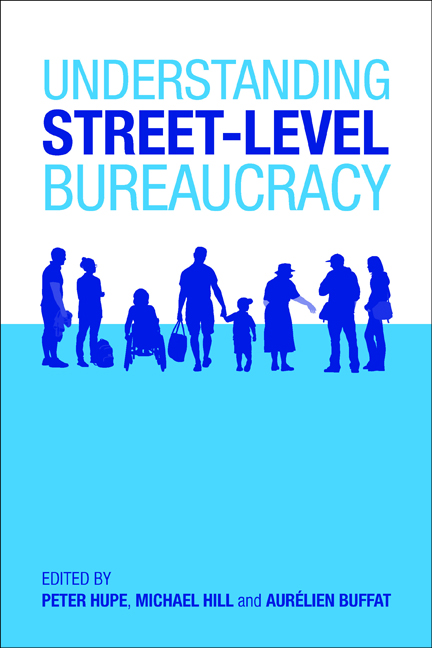Book contents
- Frontmatter
- Contents
- Biographical notes
- Preface
- Part One Introduction
- Part Two Delivering services and benefits: street-level bureaucracy and the welfare state
- Part Three Agents of the state: street-level bureaucracy and law enforcement
- Part Four Embedded in society: street-level bureaucrats as public actors
- Part Five The management of street-level bureaucrats
- Part Six The promise of professionalism
- Part Seven Conclusion
- References
- Index
Six - Law enforcement and policy alienation: coping by labour inspectors and federal police officers
Published online by Cambridge University Press: 08 March 2022
- Frontmatter
- Contents
- Biographical notes
- Preface
- Part One Introduction
- Part Two Delivering services and benefits: street-level bureaucracy and the welfare state
- Part Three Agents of the state: street-level bureaucracy and law enforcement
- Part Four Embedded in society: street-level bureaucrats as public actors
- Part Five The management of street-level bureaucrats
- Part Six The promise of professionalism
- Part Seven Conclusion
- References
- Index
Summary
From work alienation to policy alienation
Front-line officers in law enforcement agencies inspect whether or not laws are complied with. They operate in various fields of law, such as criminal, environmental, social and labour law. As typical street-level bureaucrats, law enforcement officers perform their tasks with limited resources within a restricted amount of time, while having ‘substantial discretion in the execution of their work’ (Lipsky, 2010, p 3). These front-line officers might, however, experience frustration when their regulatory activities do not lead to lawbreaking being stopped. This could result from perpetrators finding creative ways to circumvent the rules, while officers’ legal powers are limited. Furthermore, when enforcement activities do not actually address societal problems, frustration might arise among these officers. Laws that are created to stop human misery could, in fact, aggravate victims’ distress or increase injustice.
Such forms of frustration relate to the concept of ‘policy alienation’ in the implementation literature. This concept is partly connected to, but clearly distinct from, ‘job alienation’ (Blauner, 1964) and ‘work alienation’ (Lipsky, 2010). Blauner's (1964) work on job alienation particularly focuses on how various aspect of the job (eg the impersonal control system) lead to workers feeling powerless. When workers have a lot of discretion, they might feel more powerful, which could reduce job alienation. Lipsky's (2010) research on work alienation confirms that street-level work is alienating when front-line officers experience a lack of discretion to assert influence over the type of sanctions and rewards they issue in dealing with clients. However, he adds that alienation could also result from work that requires officers ‘to deny the basic humanity of others’ (Lipsky, 2010, p 75) or from feeling unable – as a result of restraints in time and resources – to fully respond to clients’ needs. In other words, work alienation is, in Lipsky's research, intrinsically bound with the relationship between the front-line worker and their clients. Policy alienation, however, deals between front-line workers and their clients. Tummers, Bekkers and Steijn (2009, p 686) define policy alienation as the ‘general cognitive state of psychological disconnection from the policy programme being implemented’. The concept is multidimensional and consists of policy powerlessness and policy meaninglessness.
- Type
- Chapter
- Information
- Understanding Street-Level Bureaucracy , pp. 99 - 114Publisher: Bristol University PressPrint publication year: 2015
- 4
- Cited by

